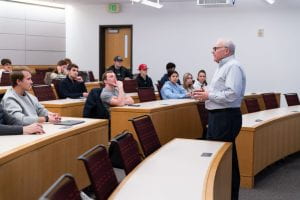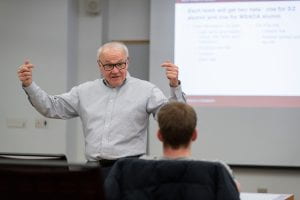
Intro to Careers Workshop photos were taken on April 1, 2022
This BUS-A 313 1.5-credit hour course will provide an overview of the broad set of career opportunities in accounting and enhance students communication and networking skills. This course will be offered starting Spring 2022.

When the Accounting Department initially launched the Introduction to Careers in Accounting (A313) pre-workshop course in spring 2022, faculty wondered what the student response would be. It turns out the demand was so great that they are offering the pre-workshop course again this fall.
The Introduction to Careers in Accounting course invites accounting professionals to come in and speak to students about various careers in accounting.
“We’ve had 20 alums participate in class as guest speakers or panelists, including AAG members Derek Bang, Cathy Bedrick and Holly McKenzie,” says Professor Dave Greene, who teaches the course. He estimates that more than 200 alumni and friends participated in the Career Fact Sheets exercise and at least 100 more participated in the Career Fair in April 2022 via Zoom.
Students are required to interact outside of class with alumni and professionals in the field, enabling them to ask any questions they may have about the field or its scope.
“A big part of this pre-workshop course is having professionals from various industries come in, so it’s not just audit and corporate professionals, but also private equity and consulting because accounting translates to a lot of different career options,” says graduate assistant Jared Dunnett. “We really just want to expose these students to as many options as we can.”
One of the main aspects of this preworkshop course is an extended group project where students are assigned a specific industry or field—from audit to investment banking to academia. Students are asked to interact with eight different professionals in the field. They then create a two- to three-page fact sheet on that specific career, which is compiled into one giant book that is shared with the class.
“They prepare one and get 34 in return,” says Greene.
While some information included in Career Fact Sheets can be gathered by researching publicly available information, most of the information requires students to network with alumni who work in these areas.
“They’re getting answers from people who are directly in that field so they know what they can expect once they graduate and enter that field,” says graduate assistant Tiana Samardzija. “They learn everything from what the travel looks like to what the pay structure is as well as the client interaction.”
They ask students to include questions like, “What’s the hourly time commitment? How much are you in the office? How much teamwork do you participate in? What other departments might you work with? What skills transfer from your undergraduate work to this career?”
“We want to give them a detailed overview of a career that they couldn’t find just by googling about it,” says Dunnett.
In prior courses, professors have asked students from all majors to use a program called Career Leader to help them identify their unique strengths, weaknesses, and interests and subsequently narrow in on suitable career paths. It involves filling out surveys, gathering information on their perceived strengths, and seeing how their interests rank among their classmates.
“Professor Greene pulled in that data to help students understand that if you have an interest in, say, managing people, and your classmates don’t have that same interest, you should be able to capitalize on that,” says graduate assistant Mady Day. “You can then take that knowledge and try to find a competitive advantage in your future career.”
Adds graduate assistant Brian Ritchie, “It’s all about helping students see where they can differentiate themselves in the market.”
After taking the Introduction to Careers in Accounting course, students can apply for admission to one of four accounting workshops. The fall workshops include Assurance Control & Information Systems, Tax Advisory Services, and Corporate Accounting. The Financial and Transactional Consulting workshop is only offered in the spring and requires students to be admitted to the 3/2 MBA program. Greene created a Word document outlining how each of the 30 careers they are exposed to translates to the best workshop for them.
Panels of three to four alumni answer questions about what they do and why the career suited them.
The value-add of this course cannot be overstated. The exposure it gives to students, by showcasing a variety of careers, is so helpful. It doesn’t take the place of an internship but rather, helps a student determine what internship might fit them best.
Introduction to Careers in Accounting also helps students improve their soft skills. This includes guided networking, how to email a professional, what to ask in an informational interview, as well as interview preparation and resume workshops.
The instructors treat their A313 students more like graduate than undergraduate students. For instance, every week graduate assistants share current event articles about specific careers or news in the accounting profession. They also include reflective questions. During class, students discuss the articles and practice their business communication skills.
“It forces them to dig deeper into what it means for a future career in accounting as they ask, ‘How does this relate to auditing, tax, risk advisory, or investment banking?’” says Day. “We stress how they should start thinking about the business world and ways they can become a well-rounded professional.”
A common sentiment among professionals who come in to speak is, “I wish I’d had this when I was a college student!”
Leave a Reply